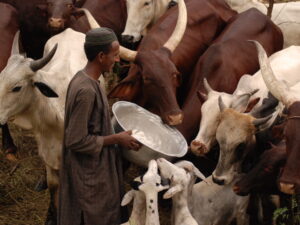How Fulani pastoralists in Nigeria are fighting back against mastitis and antimicrobial resistance
Measures to prevent infections aim to reduce antibiotic use and improve milk production
By Ciara Vance and Jeimmy Suarez-Martinez

A Fulani herder tends to his cattle. Herders are using new measures to prevent mastitis infections and improve milk production. Credit: JCTownsley
In central Nigeria, Fulani pastoralist Adamu is worried about one of his cows. She has been lethargic, is not grazing much, and has produced less milk lately. She is also in pain – at milking she kicks him whenever he touches her swollen, hard, painful udder. But must keep milking her; he needs what little milk she produces, even though it is now watery and contains blood clots. Adamu recognises these symptoms; he sees this all too often in his herd. His cow has mastitis. Adamu knows what to do: he will treat her with antibiotics.
Adamu and his neighbours have no access to a vet or health officer. Without professional advice on treatments, he turns to his community. After all, this is a well-known disease amongst the herdsmen and many know first-hand the devastating impact it can have on their cows, milk production and income. Fortunately, somebody he knows offers to sell him some antibiotics. This is a relief as there are no veterinary pharmacies nearby.
Adamu injects his sick mastitic cow with the antibiotics. He may not know the name or type of antibiotic he is giving her, but he is thankful to have something that may stop the infection.
After a few days’ treatment with the antibiotic, Adamu’s cow seems to be improving. The swelling in her udder has reduced and she has not kicked him for the past two days! Sadly, this joy is short-lived, and the mastitis returns. As always, Adamu wonders what he did wrong. Did he use the incorrect antibiotic? Maybe he should have injected more or carried on for longer? Perhaps the antibiotic was a fake? He doesn’t know, and without veterinary input he never will. But he cannot give up on his cow or his livelihood. And with that Adamu sets off to get advice from the local herdsmen again….. hopeful the next antibiotic he tries will work better.
Adamu is a fictional character, but the challenges he faces are based on evidence provided by real Fulani herdsmen. In early 2020, Supporting Evidence Based Interventions (SEBI) interviewed pastoralists from Plateau State in central Nigeria on mastitis management and antimicrobial usage and we used their responses to form the narrative of our story. Over the past year, SEBI has been working closely with Nigerian partners on mastitis prevention and early diagnosis.




Comments are closed
Comments to this thread have been closed by the post author or by an administrator.